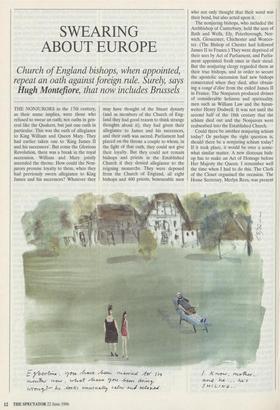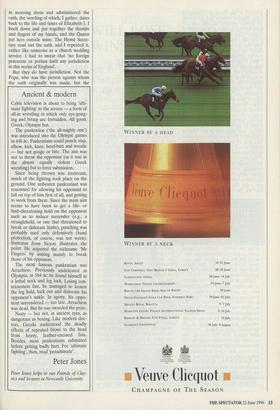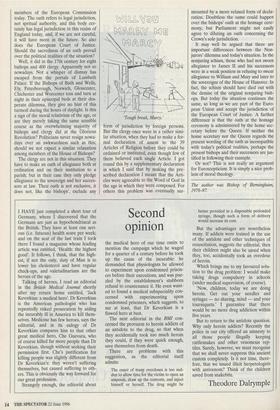SWEARING ABOUT EUROPE
Church of England bishops, when appointed, repeat an oath against foreign rule. Surely, says
Hugh Montefiore, that now includes Brussels THE NONJURORS in the 17th century, as their name implies, were those who refused to swear an oath; not oaths in gen- eral like the Quakers, but just one oath in particular. This was the oath of allegiance to King William and Queen Mary. They had earlier taken one to 'King James II and his successors'. But come the Glorious Revolution, there was a break in the royal succession. William and Mary jointly ascended the throne. How could the Non- jurors promise loyalty to them, when they had previously sworn allegiance to King James and his successors? Whatever they may have thought of the Stuart dynasty (and as members of the Church of Eng- land they had good reason to think strange thoughts about it), they had given their allegiance to James and his successors, and their oath was sacred. Parliament had placed on the throne a couple to whom, in the light of that oath, they could not give their loyalty. But they could not remain bishops and priests in the Established Church if they denied allegiance to the reigning monarchs. They were deposed from the Church of England, all eight bishops and 400 priests, honourable men who not only thought that their word was their bond, but also acted upon it.
The nonjuring bishops, who included the Archbishop of Canterbury, held the sees of Bath and Wells, Ely, Peterborough, Nor- wich, Gloucester, Chichester and Worces- ter. (The Bishop of Chester had followed James II to France.) They were deprived of their sees by Act of Parliament, and Parlia- ment appointed fresh ones in their stead. But the nonjuring clergy regarded them as their true bishops, and in order to secure the apostolic succession had new bishops consecrated when they died, after obtain- ing a cone d'elire from the exiled James II in France. The Nonjurors produced divines of considerable holiness and spirituality, men such as William Law and the hymn- writer Henry Dodwell. It was not until the second half of the 18th century that the schism died out and the Nonjurors were reabsorbed into the Established Church.
Could there be another nonjuring schism today? Or perhaps the right question is, should there be a nonjuring schism today? If it took place, it would be over a some- what similar matter. A new diocesan bish- op has to make an Act of Homage before Her Majesty the Queen. I remember well the time when I had to do this. The Clerk of the Closet organised the occasion. The Home Secretary, Merlyn Rees, was present in morning dress and administered the oath, the wording of which, I gather, dates back to the life and times of Elizabeth I. I knelt down and put together the thumbs and fingers of my hands, and the Queen put hers outside mine. The Home Secre- tary read out the oath, and I repeated it, rather like someone at a church wedding service. I had to swear that 'no foreign potentate or prelate hath any jurisdiction in this realm of England'.
But they do have jurisdiction. Not the Pope, who was the person against whom the oath originally was made, but the members of the European Commission today. The oath refers to legal jurisdiction, not spritual authority, and this body cer- tainly has legal jurisdiction in this realm of England today, and, if we are not careful, it will have more in the future. So also does the European Court of Justice. Should the sacredness of an oath prevail over the political realities of the situation?
Well, it did in the 17th century for eight bishops and 400 clergy. Apparently not so nowadays. Not a whisper of dismay has escaped from the portals of Lambeth Palace. If the Bishops of Bath and Wells, Ely, Peterborough, Norwich, Gloucester, Chichester and Worcester toss and turn at night in their episcopal beds at their des- perate dilemma, they give no hint of this turmoil during the hours of daylight. Is this a sign of the moral relativism of the age, or are they merely taking the same sensible course as the overwhelming majority of bishops and clergy did at the Glorious Revolution? Politicians never resign nowa- days over an awkwardness such as this; should we not expect a similar relaxation among members of the House of Bishops?
The clergy are not in this situation. They have to make an oath of allegiance both at ordination and on their institution to a parish; but in their case they only pledge allegiance to the sovereign and her succes- sors at law. Their oath is not exclusive, it does not, like the bishops', exclude any `Tough break, Marcy.'
form of jurisdiction by foreign persons. But the clergy once were in a rather simi- lar situation, when they had to make a for- mal declaration of assent to the 39 Articles of Religion before they could be ordained or instituted, even though few of them believed each single Article. I got round this by a supplementary declaration in which I said that by making the pre- scribed declaration I meant that the Arti- cles were agreeable to the Word of God in the age in which they were composed. For others this problem was eventually sur- mounted by a more relaxed form of decla- ration. Doubtless the same could happen over the bishops' oath at the homage cere- mony, but Parliament might not easily agree to diluting an oath concerning the Crown's sole jurisdiction.
It may well be argued that there are important differences between the Non- jurors' dilemma and today's situation. In the nonjuring schism, those who had not sworn allegiance to James II and his successors were in a weak position in refusing to swear allegiance to William and Mary and later to the sovereigns of the House of Hanover. In fact, the schism should have died out with the demise of the original nonjuring bish- ops. But today the situation continues the same, so long as we are part of the Euro- pean Union and accept the jurisdiction of the European Court of Justice. A further difference is that the oath at the homage ceremony is administered by the home sec- retary before the Queen. If neither the home secretary nor the Queen regards the present wording of the oath as incompatible with today's political realities, perhaps the present bishops and their successors are jus- tified in following their example.
Or not? This is not really an argument for Euroscepticism. It is simply a nice prob- lem of moral theology.
The author was Bishop of Birmingham, 1978-87




























































 Previous page
Previous page